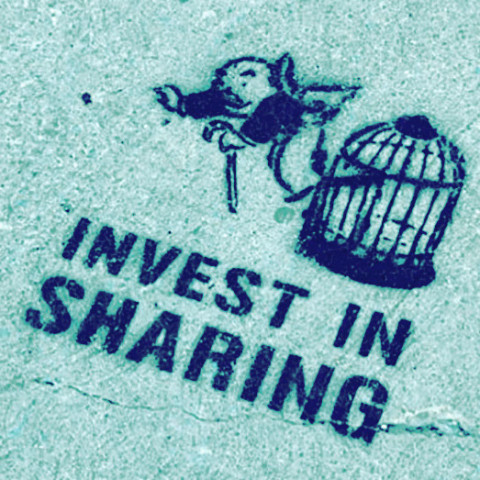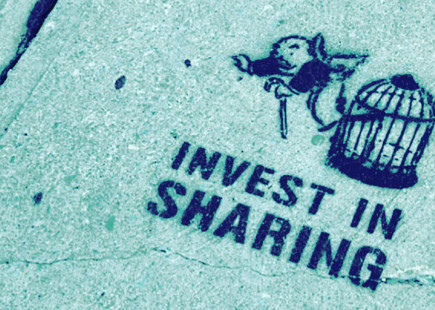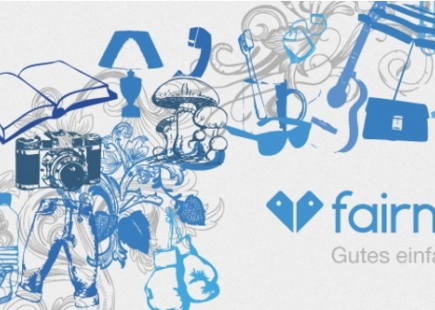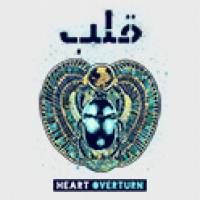Culture of the Commons Interview with Mayo Fuster Morell
Mayo Fuster Morell, responsible for BarCola, a group working on collaborative economy policies in Barcelona, shares her thoughts and experiences on how commons-based forms of collaboration can build a more just society.


What is the commons?
Commons is an ethos and an umbrella term which encompasses many practices and transformative changes. The commons emphasises common interests and needs. It includes collaborative production, open and shared resources, collective ownership, as well as empowering and participative forms of political and economic organizing.
It is, though, a very plural concept with very diverse ‘traditions’ and perspectives. Some commons for example, are connected to material resources (pastoral, fields, fishing etc) and others to immaterial ones (knowledge etc).
In the area of knowledge commons, the emphasis is on the conditions of access - open access and the possibility to access resources and intervene in their production without requiring the permission of others. It emphasises knowledge as a public good, a patrimony, and a human right.
Why do you believe we need to return to the idea and practices of the commons?
Commons were present prior to capitalism. But somehow this question implies that the commons is something of the past, not of the present. Is the family, the market, or public space something of the past? Would we pose such a question about these ways of organising ourselves? Commons is an integral part of our present society; not something to recover from the past.
Good point. Perhaps then the question is why is the issue rising up the political agenda?
I think this is partly connected to the democratization of knowledge and engagement that came with the arrival of the Internet. Cyber-scholars such as Yochai Benkler (author of Wealth of Networks), argue that the commons moved from the margins to the center of many economic systems, because of the reduction of costs for collective action due to the widespread adoption of ICT. Others such as Carol Rose (author of The Comedy of the Commons) have shown how internet commons resources become more valuable the more people access them- which undermined former critiques of the commons who argued that they were unsustainable and encouraged free-riders. With the internet, the opposite is true!
Another trajectory that has come to the fore is that of the collective governance of natural resources, in which community governance of a common-owned resources is central. This is the frame of Nobel-prize winner Elinor Ostrom’s school.
Another trajectory we can see is that of defending public services and the resistance to neoliberal enclosure of public institutions, which TNI does a lot of work on.
Yet despite these diverse trajectories, they clearly all point to integral parts of our current system and provide solutions.
Why did digital culture draw so heavily - and continue to have strong - commons-based approaches?
There are many reasons. I would highlight two. The first is the fact that digital culture emerged, in many ways, from counterculture. This story is very well told in a book by Turner, From Counterculture to Cyberculture. Hippies and psychedelic subcultures were amongst the first to see the utility of the Internet, developing virtual communities. The values of community were very present in these early forms of the internet. In fact, the Internet itself was and could still be conceived as a commons - even it has been increasingly enclosed by corporations allied with authoritarian regimes.
The second reason is the decentralised character of the Internet. This enabled the democratisation of access to the means of cultural production. Today, large parts of the population have access to immense resources of knowledge, along with programs to create and remix that knowledge. The internet also facilitated new forms of distribution of that knowledge, which favoured collaborative and open production. It made an economy based on collaborative and open production and distribution and sharing more efficient than closed, proprietary and product-based modes of the previous industrial era.
What stands out for you as the most interesting concrete projects in the digital commons?
Wikipedia certainly is one. Since its creation in 2001, it has become one of the largest reference websites in the world, with an incredible 70,000 active contributors working on more than 41 million articles in 294 languages. The Free and Open source project, that has enabled people to freely use, copy, study, and change software in any way, and underlies many well-known software systems is another one.

Fairmondo.de
The rise of platform cooperatives such Fairmondo and SMart are also promising developments. Fairmondo is an online marketplace for ethical goods and services, that originated in Germany and has expanded to the UK. It is a cooperative alternative to Amazon and Ebay. SMart is a cooperative that pools services and skills to make them affordable for creative freelancers.
Crowdfunding platforms like Goteo, which are building alternatives to the current financial system are also potentially very significant. Goteo has created a community of over 65,000 people, providing civic crowdfunding and collaboration on citizen initiatives and social, cultural, technological and educational projects.
It seems digital commons movements are integrally linked with culture - both in the way they work and the cultural outputs they are producing. What are the lessons for social movements in general?
I think it’s useful to highlight two great conceptions of culture: culture (with a small ‘c’) and Culture (with a big ‘C’). Culture refers to artistic expression, culture refers to our anthropological nature. Every human activity involves culture, and so with this meaning certainly, commons are connected to culture.
It is perhaps not a surprise that the commons emerged as a predominant organizational form to organize the governance and sustainability of artistic production. These forms of Culture are often based on self-governed modalities, favoring open access, innovation and remix, and putting community needs and creativity first and profitability second.
As I mentioned, one of the first digital areas to favor a more commons organizational form of production was in the area of software production, with the emergence of free and open source projects like Linus or Apache which became the dominant mode of production (larger than proprietary systems) in certain areas of software industry. From there, it was an easy step to move commons-based organization of music, and film, and also encyclopedias and other content subjects, that could benefit from collaborative production. The term free culture refers to this
Now, we see commons production expanded to almost any area of production, including currencies, city landscapes (like urban gardens and orchards), architecture (FabLab), and the open design of cars (Like Wikispeed car) to toys. The early forms of the digital commons have helped inform these newer forms.
Regarding lessons for social movements, I think they can help us expand the conception and practice of participation moving from forms of organizing that require high levels of involvement by a few, super activists towards models based on economies of participation. The key is to integrate participation based on diversity - not only strong contributors, but also allowing for weak and sporadic involvement, and people who can only follow the process and allowing those different types of involvement. Somehow we need to democratize participation in social movements in order to reach and adapt to a larger social base.
What are the key elements that make up a culture of the commons?
Commons are very very diverse, that is something that defines them, as they adapt to local and specific circumstances, and are embedded within the specific community and commoning to which they belong.
I would say these are the great key principles, but not all of them are necessarily present in all the families of commons or specific commons:
- Community organizing (openness to engagement)
- Self-governance of the community by the creators of the commonly-held value
- Open access to the resources created
- Ethics of looking beyond profitability to serve social and environmental needs and inclusion
Inclusion is perhaps one of the weakest elements, particularly in the Free/Libre/Open Source Software (FLOSS) movement. Studies suggest that only 1.5% of contributors in FLOSS communities are women, while in proprietary closed software production, the proportion is closer 30%. How can FLOSS be a model with such poor gender participation rates? Similarly, communities that manage natural resources, like fishing commons institutions in Albufera, Valencia, restricted women’s participation until very recently. Additionally, commons theorising tends to be very dominated by male authors, who engage very little with feminist theory.
Commons approaches need to do more to embrace more these issues, develop methodologies and highlight and learn from the cases which perform well in terms of gender inclusion. Barcelona en comu, in its attempts to reclaim political institutions for the common good, is one example where feminist wisdom is properly engaged in the commons and seeking to bring about gender equality.
Tell us about what you have been involved in through Barcelona en Comu.
I was on the initial list of people that promoted the launch of Barcelona en comu. This was a citizen platform launched in 2014 in the wake of the popular uprisings that took the squares of many Spanish cities after the financial crisis. The platform for Barcelona en comu was drawn up in a highly participative way, and has sought to put participative democracy and commons-methodologies at the heart of governance.
I am member of Barcelona en Comú and am responsible for BarCola, a group working on collaborative economy policies within the Barcelona city council. Our group has helped organise the project and conference of procomuns.net which is raising popular awareness of commons-based collaborative economic initiatives, providing technical guidelines to communities for building FLOSS technologies and making specific policy recommendations for the Barcelona City Council and for the European Union and other administrations.
Our first international event in March 2016, brought together more than 400 participants to develop 120 policy recommendations for governments.
How is the so-called ‘Shared Economy’ different to the digital commons?
The sharing economy is not different to the digital commons; it just puts more the emphasis on the economical dimension of the commons. However, there has been a wikiwashing of the term, with the media inaccurately using the term sharing economy to refer to the on-demand economy, dominated by firms like Uber and Airbnb.
These are economies based on collaborative production, but they do not include commons governance, access or an agenda of serving the public interest. A true sharing economy is one that is connected to the community and society and looks to serve the common interest, building more egalitarian relations.
How do we prevent corporations - or other structures of power such military - taking over the digital commons?
At these moment there are in my view three key strategies and goals:
1) Create public commons partnerships. Push for political institutions to be led by commons principles and to support commons-based economic production (such as reinventing public services led by citizens’ participation, what I call commonification). Barcelona en comu is providing a great model for this.
2) Reclaim the economy, and particularly develop an alternative financial system.
3) Confront patriarchy with the commons, in other words embrace freedom and justice for all, not just for a particular privileged subject (men, white, etc) and help foster greater diversity in society.
I think increasing the commons as a matrix within our systems has the greatest potential to develop an alternative to the current capitalist system.



